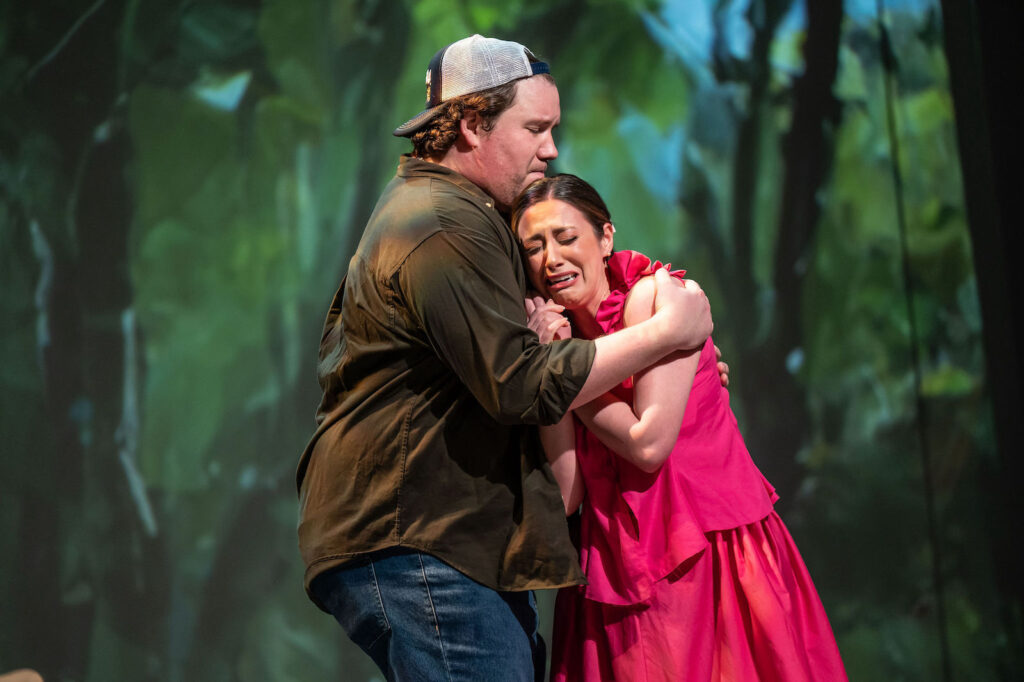“It’s about the way people is made, I reckon, and how they like to believe what’s bad.”
— Sam Polk
In the chaotic half century plus since its premiere, Susannah, Carlisle Floyd’s searing operatic discourse on persecution and injustice, has firmly established itself as a cornerstone in the ever evolving construct that is American music theatre. First presented in 1955 at Florida State University, the ferocious, reimagined Bible story ripped from the apocryphal Book of Daniel, propelled Floyd to iconic national status. Aaron Copland and Virgil Thomson, fellow champions of an unapologetically ventured domestic vernacular, would henceforth both share the same stage with the unassuming Tallahassee professor of piano and composition.
Born in Latta, South Carolina, a small rural town north of Charleston, his father a Methodist minister at the local church, Floyd leaned heavily into the abiding customs and attitudes of post Reconstruction era Dixie, a rich source of inspiration and idiom throughout his creative life. “I hated revival meetings as a child,” Floyd would later remark of a particularly traumatic series of encounters impacting his formative years. “They were frightening. It was a mass coercion of people. It’s fascism; it’s very offensive and angering, the imposing of one’s moral code on others.”
Susannah is very much the product of singular human experience, vividly recalled, recast as biting allegory — a bitter indictment of unthinking societal conformity; a denunciation of women’s oppression; a condemnation of mid-20th century McCarthyism, ample displays of not entirely dissimilar political monomania still lurking in the dark today.
Showcasing a vibrant, community-based production of a stunning masterwork, Toronto City Opera has enthusiastically shouldered Floyd’s enduringly urgent social banner with a taut Susannah of essential proportions — volatile, compelling, charged.
Set in the mountainous Uplands of eastern Tennessee, Floyd’s self-penned tale of a guiltless young woman accused of sinfulness by the rabid evangelical citizenry of the fictitious town of New Hope rings with musical inventiveness. Appalachian folk conventions — traditional melodies and stand-alone ballads interspersed with popular hymns — form an overarching compositional depth of field. Flashed with moments of colloquial panache in the style of Kurt Weill, widening to an almost Puccinian frame of reference, Floyd’s music emerges as something of a rollicking tribute to eclecticism, plain spun country melodies meet dissonant jazz meets swelling classical harmonies — all-American to the core.
Confronted with a decidedly challenging piano reduction score, music director Ivan Estey Jovanovic provides a plausibly colourful orchestral flavour to TCO’s fraught proceedings, violinist Ivan Vutev lending an air of breezy authenticity to Floyd’s rambunctious Act I barn dance by way of an irresistibly upbeat fiddle solo.
Singing the title role on opening night, lyric soprano Lauren Estey Jovanovic inhabited a Susannah of touching innocence inevitably hardening to despair as the depth of her victimization at the hands of a double cohort of blatantly hypocritical Elders and their wives proves unendurable. Gifted by Floyd with two exceptionally moving arias, the tender, Ain’t it a pretty night, followed by the composer’s heartbreaking ode to abandonment, The trees on the mountain are cold and bare, Susannah pivots, from flights of tonal elaboration to more grounded figures in the span of two comparatively brisk acts. This is music of virtuosic dimensions with frequent shifts of dynamic and pitch ruled by impossibly stratospheric tessitura. Estey Jovanovic surges forward, harmony enfolded around her, soaring and dauntless. A glowing performance of great suppleness and beauty.
Bass-baritone Dylan Wright is the devilishly manipulative itinerant preacher, Olin Blitch, a preening charlatan in black, all angles and loose limbs, slick and sly and profoundly amoral. Wright clearly revels in the monstrously antagonistic role, hurling himself, quite literally, into absolute paroxysms of feigned righteousness, his voice thunder and lightning, the Revival meeting his stormy stage. “I ain’t going take no text tonight, and I ain’t going to preach no regular sermon,” Brother Blitch exhorts, Wright hungrily prowling the aisles. “The Lord He spoke to me this afternoon and he said, ‘Blitch, there’s going to be lost souls at that meeting tonight. Don’t take no text. I’ll put words in your mouth.’” A supremely actorly spoken moment chillingly executed.
Tenor Joshua Clemenger appears as Susannah’s older brother Sam Polk, perpetual protector, dangerous when drunk, caring, sensitive; Clemenger’s ringing high note friendly voice a perfect fit, big-hearted and engaging; his Jaybird Song, Susannah’s favourite tune from childhood, a sweet, delightfully folky highlight of the evening.
Fellow tenor Alexander Cappellazzo is a touching Little Bat, a pervasive presence in Susannah’s life, painfully shy, easily frightened, eternally on the run to nowhere, son to the imperious McLeans.
Maria Malenic sings a gloriously disagreeable Mrs. McLean, shrewish, grasping, self-appointed defender-in-chief of morality in New Hope. Austin Larusson is her submissive husband and, in a delicious stroke of abundant irony, dominant Elder.
Alannah Beauparlant, Amanda Weatherall and Alexandra Delle Donne appear as Mrs. Hayes, Mrs. Ott and Mrs. Gleaton respectively, icons of intimidation. Alvaro Vasquez, Gabriel Sanchez-Ortega and Mike Fan appear as their respective husbands, slack-principled lechers to a man.
Directed by Melissa Morris — tumbled, swirling; eager choristers seemingly forever in motion — this brave, tirelessly energetic Susannah tugs at the heart, projection designer Vojin Vasovic’s painterly Biblical montages splashing the production with unexpected notes of classicism.
A thoughtful Susannah. Timeless and churning. Carlisle Floyd fearlessly upheld.
* * *
Christina Bell appears as Susannah, Saturday, February 24. Lauren Estey Jovanovic sings the role Sunday, February 25. Both remaining performances at 2:00 PM, Al Green Theatre.


